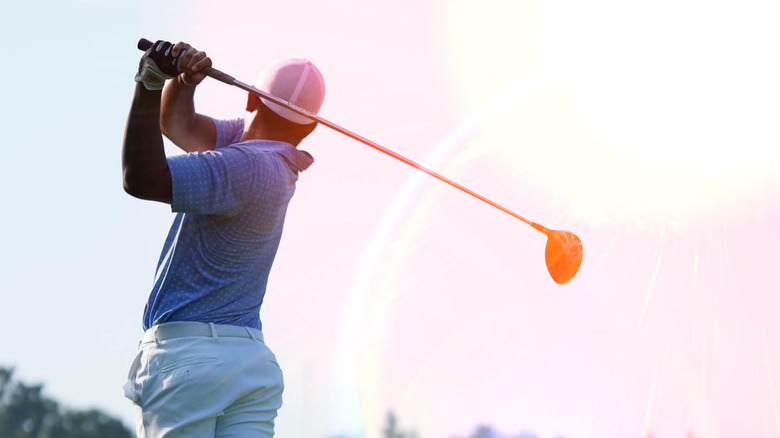Is This Why Golfers Yell Fore?
When it comes to golf, the sport has a lot of terms that could have people wondering why certain words are used. In fact, one might even wonder where the word "golf" itself came from. According to the United States Golf Association it's derived from the Dutch word "kolf" or "kolve" which means "club." But over time, the Dutch word evolved to be pronounced "goff" or "gouffe" and that eventually became "golf."
Birds also feature prominently in the golf lexicon. When a golfer gets the ball in the cup one under par, it's called a birdie. Two under par is an eagle. The United States Golf Association says that in the 19th century, the term "bird" referred to something excellent or wonderful. In 1899, when a golfer hit a great shot he would say it was "a bird of a shot." It was then decided that one under par would be called a "birdie." Sticking with the bird theme, it was decided that an eagle would be the name for a shot that's one better than a birdie. But that still leaves us wondering where the term "fore" comes from — something you'll often hear on the course, particularly from inexperienced golfers.
Some theories for the term fore
As Mental Floss notes, if you're out on a golf course, and you hear someone yell "fore" in the distance, you need to look out. The term is yelled by a golfer if there's a belief that the ball they just hit is going to hit you. So it's a good idea to duck and cover if you hear "fore." But in pretty much any other scenario when a projectile is headed for your face, people will yell "look out," or "heads up." So where does the term "fore" originate? There are a few theories, according to The Irish Times.
One theory involves what's known as forecaddies. In the early days of golf, players would send forecaddies out to the spot where they believed their shot was going to land. Then when the golfer hit the ball, they would shout "fore" to inform the forecaddie that the ball was on the way and to be on the lookout for it according to The Irish Times. Another less popular theory involves an anglicized version of the word "faugh." That word is used in Irish bowling when players shout "Faugh a Ballach," which means "clear the way."
The true origination of the word fore
Both The Irish Times and Live Science say that the forecaddies theory listed above is the true reason that the word is used in golf. However, The Irish Times also points out that the word was used in military circles as well. When gunners were shooting towards their own men in front of them, they would shout "fore" in order to let their friends on the battlefield know that live rounds were about to be fired in their direction. It's possible that golfers adopted the term from the military.
With all the different theories of how the word originated, it probably makes sense to hear what the sport's officials have to say. On the United States Golf Association website, they seem to support the military theory. The USGA states, "The word 'fore' is Scottish in origin, and is a shortened version of the word 'before' or 'afore.' The old Scottish warning, essentially meaning "look out ahead," most probably originated in military circles, where it was used by artillery men as a warning to troops in forward positions. Golfers as early as the 18th century simply adopted this military warning cry for use on the links."


